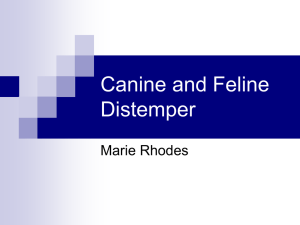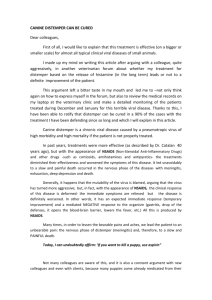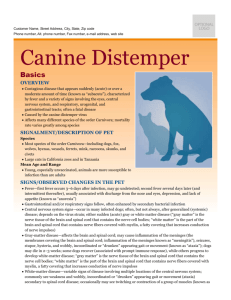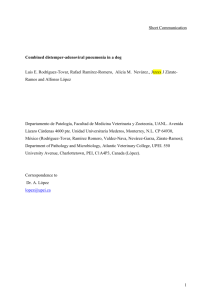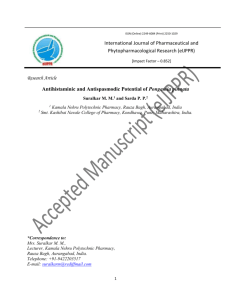APITOXINE Lots of colleagues ask me how the idea of canine
advertisement
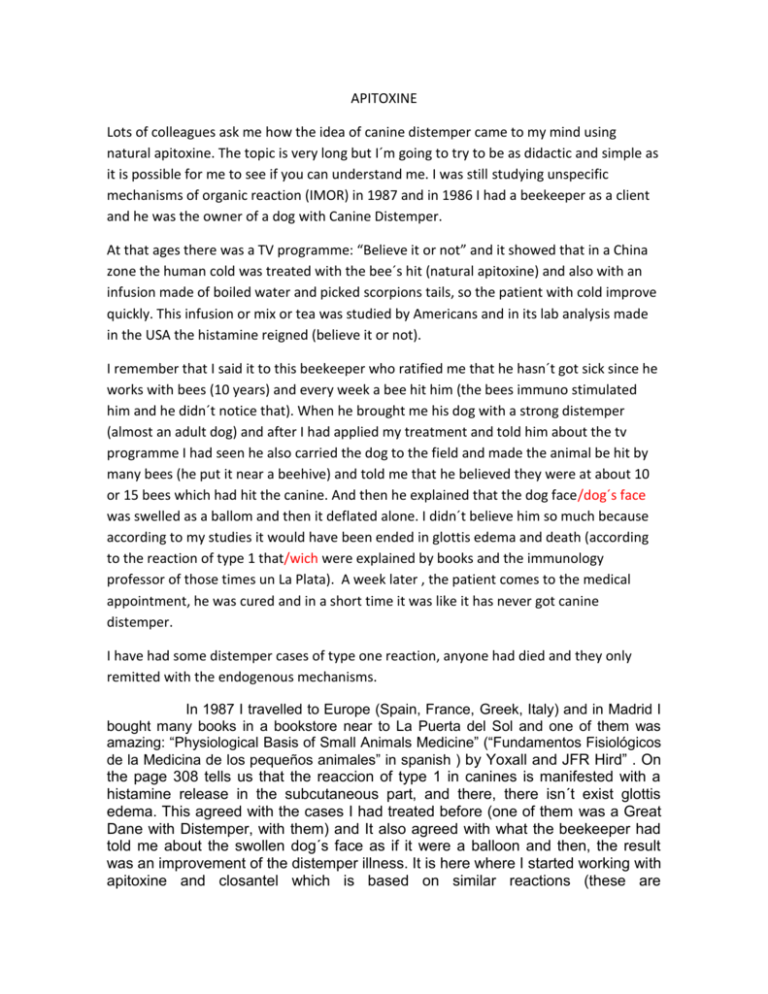
APITOXINE Lots of colleagues ask me how the idea of canine distemper came to my mind using natural apitoxine. The topic is very long but I´m going to try to be as didactic and simple as it is possible for me to see if you can understand me. I was still studying unspecific mechanisms of organic reaction (IMOR) in 1987 and in 1986 I had a beekeeper as a client and he was the owner of a dog with Canine Distemper. At that ages there was a TV programme: “Believe it or not” and it showed that in a China zone the human cold was treated with the bee´s hit (natural apitoxine) and also with an infusion made of boiled water and picked scorpions tails, so the patient with cold improve quickly. This infusion or mix or tea was studied by Americans and in its lab analysis made in the USA the histamine reigned (believe it or not). I remember that I said it to this beekeeper who ratified me that he hasn´t got sick since he works with bees (10 years) and every week a bee hit him (the bees immuno stimulated him and he didn´t notice that). When he brought me his dog with a strong distemper (almost an adult dog) and after I had applied my treatment and told him about the tv programme I had seen he also carried the dog to the field and made the animal be hit by many bees (he put it near a beehive) and told me that he believed they were at about 10 or 15 bees which had hit the canine. And then he explained that the dog face/dog´s face was swelled as a ballom and then it deflated alone. I didn´t believe him so much because according to my studies it would have been ended in glottis edema and death (according to the reaction of type 1 that/wich were explained by books and the immunology professor of those times un La Plata). A week later , the patient comes to the medical appointment, he was cured and in a short time it was like it has never got canine distemper. I have had some distemper cases of type one reaction, anyone had died and they only remitted with the endogenous mechanisms. In 1987 I travelled to Europe (Spain, France, Greek, Italy) and in Madrid I bought many books in a bookstore near to La Puerta del Sol and one of them was amazing: “Physiological Basis of Small Animals Medicine” (“Fundamentos Fisiológicos de la Medicina de los pequeños animales” in spanish ) by Yoxall and JFR Hird” . On the page 308 tells us that the reaccion of type 1 in canines is manifested with a histamine release in the subcutaneous part, and there, there isn´t exist glottis edema. This agreed with the cases I had treated before (one of them was a Great Dane with Distemper, with them) and It also agreed with what the beekeeper had told me about the swollen dog´s face as if it were a balloon and then, the result was an improvement of the distemper illness. It is here where I started working with apitoxine and closantel which is based on similar reactions (these are pharmacologic topics and veterinarian therapeutics of Dr. Juan Holenweger shown on page 386, which says that the 21 % of the dogs treated with closantel reacted of type 1, as it was described in the previous book, looking for histamine releases in an abrupt way for a quickly improvement of the viral chart. Today I use OFTALMOTROFICA VITAMINADA FROM FARVE LAB to produce this reaction in the very advanced Distemper cases, then the 6 months of the patient ages (onwards) with a spectacular success for a lot of unbelievers. This is because the apitoxine and to other drugs and substances releasers of histamine in an endogenous way in which I arrive to the conclusion that high levels of histamine in blood for a certain period of time behaves as virucidal in the same way that a certain level of antibiotics in blood behaves as bactericide. The comparison is for you to understand me (if you want I can give you the bibliography where you can consult all about histamine). Here below it is the Apitoxine work. Please excuse me for the defects (it has more than 15 years and it is based in a lot of practice and a bit of “desk”) APITOXINE: IT IS EFFECTIVE IN CANINE DISTEMPER AND IN OTHER ILLNESSES. This work has been published in Veterinaria Argentina, Volume 6, Number 56, August 1989. I worked with Apitoxine from 1987 up to 1994, in this last year I replaced apitoxine for L.A. Oxytetracycline and the classic one like immunostimulators and I started using Oftalmotrófica from Farve Lab to get reactions of type 1. The aim was to stimulated the endogenous mechanisms of defenses of the organisms to overcame the illnesses.
